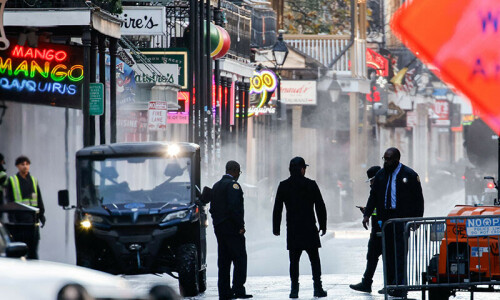
KHARTOUM: In Sudan's Arab-Muslim north, the minority Christian community anxiously awaits the outcome of the vote on independence for the south, amid threats by President Omar al-Bashir's to reinforce sharia law if it splits.
“Before the referendum, there was a sort of balance in the country between the Christians and Muslims. After secession, we will only form a small minority,” said a Christian doctor in Khartoum, asking not to be named.
“I fear that at some point we will be seen as strangers,” he added. “Who says they won't ask us to leave?”
The interim constitution adopted under the 2005 peace deal between the predominantly Muslim north and the largely Christian south recognises the “multi-ethnic,” “multi-cultural” and “multi-religious” character of Sudan.
But it is only valid until July, when south Sudan will declare independence should the vote go that way, as widely expected.
The last census, in 2008, put the number of mostly-Christian southerners living in the north at 520,000. The autonomous government in Juba estimated there to be at least 1.5 million, though many have since returned home.
North Sudan also has a small Coptic community, mostly based in Khartoum, and Christian groups inhabit the Nuba mountains and Blue Nile state on the border with Ethiopia.
But with southern independence seemingly inevitable, Bashir has repeatedly stated his intention to make sharia, or Islamic law, “the single source of the constitution” in the north.
Senior Christian figures in Sudan claim not to worry about such remarks, pointing out that they have lived under sharia law since it was first imposed in 1983 by then leader Gaafar al-Nimeiri.
“We don't expect sharia to be applied in a way that harms” non-Muslims, said Khartoum's Coptic bishop Anba Elia.
But some reckon they will have to be even more discreet about their religion, saying they are already treated as second-class citizens and suffer discrimination, including restrictions on the construction of churches.
Hafez Ramsis Hakim, who is involved in the administration of three Coptic churches in Khartoum, does not fear for the security of the Copts but he is concerned that his small community may be further excluded from public life in Sudan.
“Before, you couldn't go into a bank without finding at least five or six Christians working there. Today they are noticeably less visible,” he added.
“We are worried, sure, but we are not afraid. It's definitely true though that we are second class citizens,” said a Coptic community leader who requested anonymity so that he could “speak more freely.”
Some are circumspect about the reasons for Bashir's threats to tightening the application of sharia law.
“It's an indirect message to the United States. The president wants to tell Washington: 'if you carry on refusing to lift sanctions against Sudan, then this is the direction we're going, one of extremism,” the Coptic community leader said.
The Sudanese president also said last week that, if the south breaks away, southerners staying in the north would be treated as foreigners.
“It's logical,” said James Okuc, a young southerner working in the Khartoum. “If there is secession, I will feel obliged to leave.”
But for Al-Tayeb Zein al-Abideen, professor of political sciences at Khartoum university, the regime “is just looking for new slogans” during a difficult period.
“Bashir's speech is nothing other than a fiery reaction to secession. And even if the constitution is amended, nothing will change,” he added.
Meanwhile, a leader of one of the main Darfur militant groups Abdelwahid Mohammed Nur on Tuesday referred to the Bashir government as a “Talibanistic regime” in a reference to the Taliban.
He told AFP by phone that his group would continue to struggle for “a secular, democratic state with equal citizenship.”














































Dear visitor, the comments section is undergoing an overhaul and will return soon.